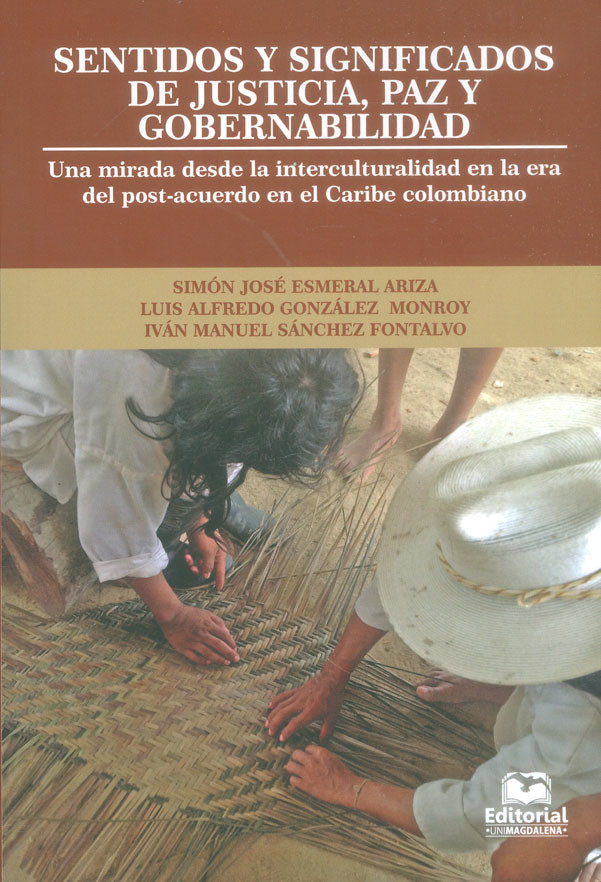
- Edición: 1
- Año de edición: {{getMes(14-1)}} de 2018
- No. de páginas: 124
- Formato: Impreso , Ebook
- Idioma: Español
- ISBN Impreso: 9789587461169
- ISBN PDF: 9789587461176
Sentidos y significados de justicia, paz y gobernabilidad
Una mirada desde la interculturalidad en la era del post-acuerdo en el Caribe colombiano
View title and subtitle in English
Title in English: Senses and meanings of justice, peace, and governability
Subtitle in English: A look from interculturality in the post-agreement era in the Colombian Caribbean
Tabla de contenidoINTRODUCCIÓN CAPÍTULO 1 1.1. SIERRA NEVADA DE SANTA MARTA 1.2. REALIDADES SOCIOCULTURALES DE LA SIERRA NEVADA DE SANTA MARTA 1.2.1. Periodo Colonial 1.2.2. Periodo Republicano 1.2.3. Periodo actual1.3. CONFLICTO ARMADO EN LA SIERRA NEVADA DE SANTA MARTA CAPÍTULO 2 2.1. JUSTICIA, PAZ Y GOBERNABILIDAD 2.1.1. El conflicto armado y las alternativas para la consolidación de la paz 2.1.2. Referentes ideológicos sobre el conflicto colombiano 2.1.3. Conflicto y comunidades indígenas CAPÍTULO 3 3.1. DINÁMICAS DEL POST-ACUERDO 3.2. INTERCULTURALIDAD 3.3. PAUTAS REIVINDICATIVAS DESDE LA DIALOGICIDAD Y LA DOBLE REFLEXIVIDADCAPÍTULO 4METODOLOGÍA4.1. DISEÑO METODOLÓGICO4.2. FASES DEL DISEÑO METODOLÓGICO4.3. TÉCNICA E INSTRUMENTO DE RECOLECCIÓN Y DE INFORMACIÓN4.4. ANÁLISIS DE LA INFORMACIÓN CAPÍTULOSRESULTADOS A MANERA DE CUMPLIMIENTOSNO CONCLUSIVOS REFERENTES BIBLIOGRÁFICOS ANEXOS
Description in English: Although multiculturalism and pluri-ethnicity have always been present in the shaping of the peoples of the Americas, it was only in the last century that they began to gain visibility and gain space in the constitutional and social framework. In this sense, Colombia has made significant progress, especially since the promulgation of the 1991 Political Constitution, in which the State recognised this multi-ethnic and multicultural character as a constituent part of nationality, based on the protection of diversity and respect for human dignity.Understanding the meanings of justice, peace and governance from the perspective of interculturality in the era of the Peace Agreement in the Colombian Caribbean means knowing how to listen. Beyond the substantive criticism that "good elitism" seeks that the best, the wisest, the most honest, the most enlightened, the best equipped, lead and govern for the common good, interculturalism seeks that we all participate in the decisions, because the sum of the voices reflects the needs, interests and dreams of all. Therefore, we need to learn to listen to the different voices of our citizens, to learn to understand where they come from, what they seek, why they ask and propose what they say. We need to learn to overcome stereotypes and prejudices, and to eliminate discrimination and the commonplace that prevents us from understanding the other person, because they prevent us from putting ourselves in his or her place, from understanding what the other person feels, from learning from him or her, and from putting our intelligence and will at the service of others.In this context, it is necessary to understand that democracy based on justice, peace and governance must be built from the perspective of knowledge and recognition of different cultures, the basis for the construction of a sense of citizenship in the people and collectives that make up the regions of Colombia. It is a commitment to the construction of knowledge in an emerging scientific rationality and in the ethical responsibility to provide meaning, coherence and identity to justice, peace and territorial governance, constituting a systemic fabric based on interculturality.View description in English
Tabla de contenidoINTRODUCCIÓN CAPÍTULO 1 1.1. SIERRA NEVADA DE SANTA MARTA 1.2. REALIDADES SOCIOCULTURALES DE LA SIERRA NEVADA DE SANTA MARTA 1.2.1. Periodo Colonial 1.2.2. Periodo Republicano 1.2.3. Periodo actual1.3. CONFLICTO ARMADO EN LA SIERRA NEVADA DE SANTA MARTA CAPÍTULO 2 2.1. JUSTICIA, PAZ Y GOBERNABILIDAD 2.1.1. El conflicto armado y las alternativas para la consolidación de la paz 2.1.2. Referentes ideológicos sobre el conflicto colombiano 2.1.3. Conflicto y comunidades indígenas CAPÍTULO 3 3.1. DINÁMICAS DEL POST-ACUERDO 3.2. INTERCULTURALIDAD 3.3. PAUTAS REIVINDICATIVAS DESDE LA DIALOGICIDAD Y LA DOBLE REFLEXIVIDADCAPÍTULO 4METODOLOGÍA4.1. DISEÑO METODOLÓGICO4.2. FASES DEL DISEÑO METODOLÓGICO4.3. TÉCNICA E INSTRUMENTO DE RECOLECCIÓN Y DE INFORMACIÓN4.4. ANÁLISIS DE LA INFORMACIÓN CAPÍTULOSRESULTADOS A MANERA DE CUMPLIMIENTOSNO CONCLUSIVOS REFERENTES BIBLIOGRÁFICOS ANEXOS
- OCDE (Área, Subárea y Disciplina) Ciencias sociales > Ciencias de la educación > Educación general (incluye capacitación, pedagogía)
- Colección y serie: Ciencias Sociales > Educación y pedagogía
- Categoría: Libro producto de investigación
- THEMA: Educación
- BISAC: EDUCACIÓN > General
- DEWEY: Sociología y Antropología > Educación > Educación más alta > Organización y gestión; currículos
- Edición: 1
- Año de edición: 2018
- ISBN impreso: 9789587461169
- DOI:
- No. de páginas: 124
- Medidas en cm (Alto, Ancho, Grosor): 23, 16, 0,6
- Idioma: Español
- Formato: PDF, EPUB
- Edición: 1
- Año de edición: 2018
- ISBN PDF: 9789587461176
- No. de páginas: 124
- DOI:
- Idioma: Español

